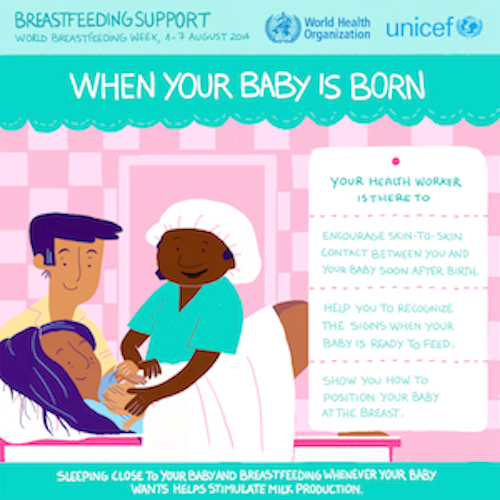Breastfeeding: The Winning Goal For Life
It is a statistic that is almost too shocking to believe. According…

It is a statistic that is almost too shocking to believe. According to the Nigerian Federal Ministry of Health, “Nigeria has one of the poorest exclusive breastfeeding rates in Africa … recent data show that the percentage of infants exclusively breastfed decreased from 17% in 2003 to 13% in 2008.”
The increase in women working outside of the home, concerns of weight gain and breasts sagging after months of lactation and the wide availability of infant formula have been among the reasons for this drastic decline.
Each year during the first week of August, the world commemorates “World Breastfeeding Week.” In true Radiant Health fashion, we are joining in the discussion and encouraging Nigerians everywhere to reconsider their infant feeding choices and choose, “BREASTFEEDING: A WINNING GOAL FOR LIFE.”
Why Breastfeed?
Breast milk is nature’s best food. It provides the major nutrients a baby needs to grow and develop during the first years. Studies show that exclusive breastfeeding – feeding a baby nothing but breast milk – correlates with positive health and social outcomes. Babies who are exclusively breastfed for 6 months:
- Suffer reduced risk of infectious diseases including respiratory infections and diarrhoea – two of the leading causes of death in infants under the age of 1
- Are at less risk of Sudden Infant Death Syndrome (SIDS)
- Enjoy better long-term health outcomes with evidence indicating that older children and adults who were breastfed have lower chances of developing diabetes, obesity, high cholesterol, and asthma
- Develop higher IQ’s than their formula-fed counterparts
- Have increased child survival rates when born to HIV positive mothers. The World Health Organization recommends HIV positive mothers whose environmental and social circumstances are not supportive of formula feeding, breastfeed exclusively for the first 6 months of life. Too many babies in the developing world die from diarrhoea, respiratory infections, and malnutrition that breastfeeding has been demonstrated to alleviate. A formula is expensive and requires safe water and adequate sanitation facilities to remain uncontaminated. Sometimes formula feeding is not sustainable. Studies also show no signs or symptoms at age 18 months.
Moms that breastfeed exclusively for 6 months enjoy:
- Faster post-pregnancy weight loss
- Lower risk of ovarian and breast cancers
- “Natural” birth control for up to 6 months post-delivery
- Improved post-menopausal bone health
If you are a working mom, breastfeeding may prove to be very challenging. This is especially true if you have to go back to work relatively soon after giving birth. There are however some things you can do to be successful:
- Invest in an effective breast pump. While manual and single breast pumps work well, double electric breast pumps are the most efficient.
- If unable to get a breast pump, use the hand method to express milk.
- Start pumping weeks before you go to work. That way you can have a stockpile and not stress too much about what baby will eat.
- Store milk in individual servings and place in a freezer. Allow milk to thaw in the refrigerator and NEVER refreeze thawed milk.
- If you live in an area with frequent electrical outages, keep the milk frozen by not opening the freezer unnecessarily while the electricity is out.
- Express milk several times while away from the baby. Breast milk production is often about “supply and demand” the more you pump, the more you will make.
- Bring baby to the breast and allow him/her to nurse often when you are together.

Breast milk is certainly best for baby and in addition to numerous health advantages; it comes free of charge, is portable, does not need sterile equipment or mixing and is always at the right temperature. Choose what is best for baby: Breastfeeding – A winning choice for health.
Here’s to your health!


